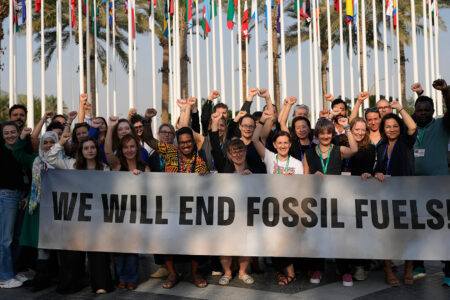
Sometime in 2015, Pope Francis is expected to produce a papal encyclical setting out the Roman Catholic Church’s response to ecological and environmental challenges. The Pope has already signalled that he regards environmental issues as a concern to the Church, and his interest is merely the latest sign of an awakening within religious communities to the connection between spirituality and the science and economics of climate change.
Not all Christians—or followers of other faith traditions—see a place for religion in this debate. Many regard their faith as strictly a matter of personal morality and choose to leave issues like climate change to the secular arena. Others are skeptical of scientific claims that human activity is capable of altering what they see as God’s design for the planet, calling the warnings of global warming—or attempts to control it—a dangerous human conceit.
For all climate change activists’ insistence that the science speaks for itself, it is clear that many people approach the issue from the perspective of personal values. That means engaging with those who see the world through a religious prism and come to the climate change debate as a moral question. Because as the ethical dimensions of the issue emerge, it has become harder for religious thinkers to keep their heads down. Does climate change carry greater risks for the world’s poor? Do the policy measures we use to try to solve the problem have unequal effects? Do people of faith see a moral obligation to preserve Creation for future generations?
Climate change asks hard questions of all faith traditions and philosophies. The writers in this issue of Policy Options look at religion and the environment from a Christian perspective, but their words are merely a jumping-off point for what must be a larger conversation between faiths and also between the religious and the secular worlds. Operating from the premise that the current scientific-political focus has failed to illuminate a path to sustainability, the Christian writers point to signs in the Scripture that call upon us to protect the natural world. They make a connection between the moral limits of individualism and the physical limits the earth imposes on human life. And they see the preservation of nature as essential to our sense of community.
“God always forgives, but the earth does not,” Pope Francis said in a speech in Rome last year, foreshadowing the encyclical to come. “Take care of the earth so it does not respond with destruction.” Amen.
Tackling climate change questions from a religious perspective is not a traditional approach to writing about public policy debate in Canada. But it reflects the kind of fresh thinking we’ve tried to bring to Policy Options since I became editor in the fall of 2012. It is therefore a fitting issue to finish on, as we turn the editorship over to Dan Gardner, an award-winning journalist who is perfectly suited to taking a refurbished magazine and digital platform into new territory for policy writing.
Policy Options holds a singular place in the Canadian policy community, partly by virtue of its longevity and largely by the force of its previous editors. But technological upheaval has wreaked havoc in media and the policy environment, requiring the magazine to adapt to the times. Change meant a search for new voices and a greater mix of perspectives. It required making the print magazine more visually appealing and building a digital platform that can now be fully exploited going forward. And it meant setting Canadian policy issues in the context of global currents, pushing us all to lift our chins a bit to see the country in a less insular light.
Change is always unsettling, and I am grateful for the unflinching support of Graham Fox and the IRPP board throughout the process. I was also fortunate to work with a wonderful group of colleagues who produce the magazine, and who embraced the journey with good humour and enthusiasm. For Policy Options, the best days still lie ahead.
Photo: Shutterstock






